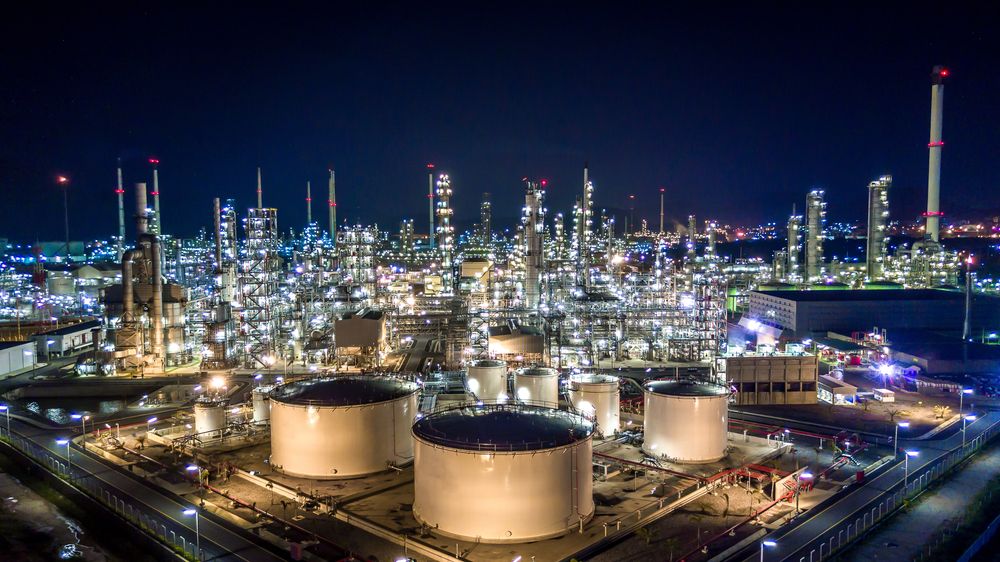RIYADH: Oil prices fell on Monday in holiday-sapped trade in Asia as concerns about slowing economic growth in China, the world’s top oil importer, outweighed fears of potential supply disruptions from a looming EU ban on Russian crude.
Brent crude futures fell $1.21, or 1.1 percent, to $105.93 a barrel at 0205 GMT, while US West Texas Intermediate crude futures fell 99 cents, or 1 percent, to $103.70 a barrel. Markets in Japan, India and Southeast Asia were closed for public holidays on Monday.
Iraq’s oil exports reach 101mn barrels in April
Iraq exported 101.4 million barrels of oil in April, raising revenues of $10.55 billion, the oil ministry said in a statement on Sunday.
Over the month, exports averaged 3.4 million barrels per day, the ministry added.
Missile attack causes tank fire in Iraq oil refinery
A missile attack targeted an oil refinery in Iraq’s northern city of Irbil on Sunday, causing a fire in one of its main tanks that was later brought under control, said the Iraqi security forces.
A missile also landed on the outer fence of the refinery without causing any casualties, the statement added.
Earlier on Sunday, the anti-terrorism authorities in the Kurdistan region said six missiles landed near the KAR refinery in Irbil, adding they were launched from Nineveh province.
After the attack, the security forces said they found a launchpad and four missiles in the Nineveh Plain and defused them.
Iraqi Prime Minister Mustafa Al-Kadhimi said the armed forces would pursue the perpetrators of what he called a “cowardly attack” while discussing the security situation in a phone call with Kurdish leader
Masoud Barzani, the prime minister’s office said on Twitter.
Three missiles also fell near the refinery on April 6 without causing any casualties. Sources in the Kurdistan Regional Government told Reuters then that the refinery is owned by Iraqi Kurdish businessman Baz Karim Barzanji, CEO of major domestic energy company KAR Group.
EU leans towards Russian oil ban by year-end: diplomats
The EU is leaning toward a ban on imports of Russian oil by the end of the year, two EU diplomats said, after talks between the European Commission and EU member states this weekend.
The EU is preparing the sixth package of sanctions against Russia in response to the invasion just over two months ago of Ukraine that Moscow calls a special military operation.
The package is expected to target Russian oil, Russian and Belarusian banks, and more individuals and companies.
The Commission, which coordinates the EU response, held talks dubbed “confessionals” with small groups of EU countries and will aim to firm up its sanctions plan in time for a meeting of EU ambassadors in Brussels on Wednesday.
EU energy ministers are also due to meet in the Belgian capital on Monday to discuss the issue.
The EU diplomats said some EU countries were able to end their use of oil before the end of 2022, but others, particularly more southerly members, were concerned about the impact on prices.
Germany, one of the bigger buyers of Russian oil, appeared to be willing to go along with the end-2022 cut-off, the diplomats said, but countries including Austria, Hungary, Italy and Slovakia had reservations.
An adviser to Chancellor Olaf Scholz said Germany backed an EU ban on Russian oil imports but needed a few months to secure alternatives.
“We’re asking for a considered wind-down period,” said Joerg Kukies in the Financial Times. “We want to stop buying Russian oil, but we need a bit of time to make sure we can get other sources of oil into our country,” he added.
Kukies said Germany wanted to ensure that a refinery in Schwedt, Northeastern Germany, operated by Russian state oil company Rosneft could be supplied with non-Russian oil brought by tankers to Rostock on the Baltic Sea.
He told the Financial Times that to allow this, the port of Rostock would have to be deepened and work done on the pipeline linking it to Schwedt.
(With inputs from Reuters)

